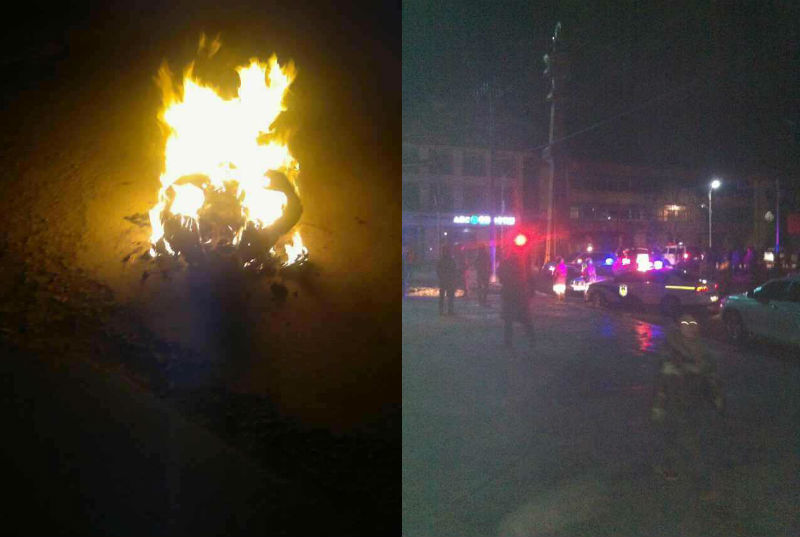 Dharamshala: - A Tibetan Buddhist monk has died after setting himself on fire Monday evening in Pema township of Golok county, north-eastern Tibet, apparently in protest against the Chinese repressive rule over the Tibetan soil 'Tibet'.
Dharamshala: - A Tibetan Buddhist monk has died after setting himself on fire Monday evening in Pema township of Golok county, north-eastern Tibet, apparently in protest against the Chinese repressive rule over the Tibetan soil 'Tibet'.
A reliable regular source told Tibet Post International that "Lobsang Gedhun, a 29-year old Tibetan monk from Penag Kadhak Troedral-Ling Monastery the region set himself ablaze around 7.10pm local time, Monday evening, december 3, 2012."
"After many footsteps, with shouting anti-China protest slogans (currently unknown), he fell down on the ground and died on the spot. The local Tibetans Immediately protected Lobsang's body from Chinese police and troops who arrived shortly after the protest," the source inside Tibet stated.
"Lobsang's body was taken by local Tibetans to his monastery called 'Penag Kadhak Troedral-Ling Monastery,' Selethang village, Pema city, Golok county, north-eastern Tibet to offer their prayer service and last respect. He had eleven family members, including his father Golok LoKho, and his mother Sago Dewang." the source further added.
Despite the buildup of troops in the area and imposing heavy restrictions on the local Tibetans, images from Pema township in golok today show local people gathered at the scene of his self-immolation. One photo shows the body of Lobsang still on burning, while another shows evening street where he set himself ablaze.
The tragic wave of Tibetan immolations have reportedly been carried-out by Tibetans as a highest form of non-violent protest against the Chinese government's systematic repression of their freedom of religion and human rights, destruction of Tibetan language, culture and environment, and assimilation of Tibetan nationality through induced massive influx of Chinese population into Tibet.
However, China accused the spiritual leader of Tibet, His Holiness the Dalai Lama and the exile Tibetan community of planning the self-immolations in the Himalayan region and ruled-out allowing any international observers to visit Tibet to investigate human rights abuses.
Over 92 people have set themselves on fire since the self-immolations began in 2009 and at-least 75 of them have died. Most self-immolators were lay and the younger generation of Tibetans in recent months, who are speaking up against the Chinese regime's rule in Tibet, called for the return of His Holiness the Dalai Lama from exile and freedom in Tibet.
"The international community must not remain an idle bystander. Governments, international bodies, human rights organizations and individuals can make a difference by intensifying their efforts to convince the Chinese government to resolve the issue of Tibet through dialogue," the exile Tibetan administration said in a statement issued on Monday evening, just hours before the latest incident.
"With the wave of self-immolation continuing in Tibet with over 91 Tibetans having set themselves on fire to date (78 in 2012, including 28 in November alone) and the Chinese government's harsh response, the Kashag (Cabinet) maintains its steadfast efforts to make the current situation in Tibet known to the global community," the administration further stated.


![Tibet has a rich history as a sovereign nation until the 1950s when it was invaded by China. [Photo: File]](/images/stories/Pics-2024/March/Tibet-Nation-1940s.jpg#joomlaImage://local-images/stories/Pics-2024/March/Tibet-Nation-1940s.jpg?width=1489&height=878)















